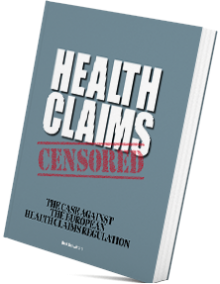5 February 2013
Dutch version available
While discussing the effects of the Nutrition and Health Claims Regulation with NutraIngredients’ Shane Starling, Dr. Basil Mathioudakis[1], is quoted as having stated: “You cannot build a sustainable food industry on misleading health claims.”
With all due respect, it’s a puzzling statement.
Long before the year 2007, when the Health Claims Regulation entered into force, European consumers, consumer advocates and competent authorities had at their fingertips a profuse body of European and national consumer protection laws, regulations and case law that opened a horizon-wide window to seek redress of all grievances against business operators who were caught misleading consumers.[2]
As early as 1975, an EU Council Resolution stated that “[t]he consumer is no longer seen merely as a purchaser and user of goods and services for personal, family or group purposes but also as a person concerned with the various facts of society which may affect him directly or indirectly as a consumer.” In view of this visionary concept, the Council specifically addressed:
(a) the right to protection of health and safety,
(b) the right to protection of economic interests,
(c) the right to redress,
(d) the right to information and education,
(e) the right of representation (the right to be heard).
Long before Consumer Protection laws came into being, in fact, long before any law or regulation came into being, there existed a “food industry.” This industry goes back to the moment when mankind, learning how to better and better sustain itself, developed ways of producing, storing, harvesting, saving, preserving, enriching and cultivating foods.
During the major part of mankind’s history, humans acted without the regulatory guidance of governments and authorities. Had our forefathers chosen unsustainable methods of producing, preparing and preserving food, we would not have existed today. Yet, if my understanding of Dr. Mathioudakis’ words is correct, he suggests or implies that the millenia-old food industry never existed as a “sustainable” human activity. Why not?
Presumably, because the ultimate prerequisite for “building a sustainable food industry” had not yet been fulfilled. The pre-Claims-Regulation food industry was “unsustainable” because, according to Dr. Mathioudakis, there was no system – regulatory or other – that excluded “misleading health claims.” Obviously, the abundance of pre-2007 consumer protection laws, case law and regulations that enabled consumers, consumer advocates and authorities to keep misleading commercial information in check, was insufficient to serve as a basis for a genuinely “sustainable food industry.” Why was this system insufficient?
What that old system of consumer protection lacked was the firm, solid, coercive and precautionary government intervention installed by the Health Claims Regulation. What the unsustainable food industry needed was an absolute and unconditional ex ante prohibition of all commercial speech concerning food’s benefits. A prohibition that makes no distinction between misleading and truthful speech. A prohibition that does not prohibit speech because it is misleading, but because it is commercial. A prohibition installed to replace commercial speech by public speech.
What that outmoded food industry lacked was the political genius to see how the exercise of its right to speak prior to government authorization stood in the way of building a sustainable industry. Lacking the will to voluntarily and spontaneously waive its fundamental right of freedom of speech, it helplessly lay in wait for government to come and take that right away, so that, in this case, the European Union could lay the public foundation for the promise of a sustainable food industry.
Moreover, to be laureled as “sustainable,” who would not want to also give up his position of claimant ordefendant having the right to be heard by a Court of Law that applies legal criteria in the course of well defined proceedings that must be followed when determining whether a health claim is or isn’t misleading ? Who would not prefer the disenfranchised position of applicant or supplicant who has no right to be heard by a “Court of Science” that applies self-chosen criteria in the course of proceedings loosely defined as “scientific assessment of the highest possible standard” when determining whether a health claim is or isn’t misleading.
In the European Union, we now have a State-organized, State-run and State-controlled system of distinguishing misleading from correct health claims. We have a system that denies the food industry the freedom to speak. We have a Panel of scientists applying scientific instead of legal criteria to evaluate the misleadingness of health claims. We have a legislature that authorizes health claims on the basis of the Panel’s Opinions and public health policies. We should not complain, but count our blessings. Finally, after all those millenia, we have the European Union at the helm of the food industry to steer it towards a sustainable future.
[1] Head of Directorate E4 (Nutrition, food composition and information) of the Directorate General for Health and Consumers of the European Commission.
[2] See e.g. EU Consumer Law and Policy; Stephen Weatherill; Edward Elgar Publishing Ltd; 2005.
Bert Schwitters




